If you’ve noticed the Bigfoot-style vlog videos popping up everywhere on social media, you’re not alone. These quirky, engaging clips have captured the imagination of viewers, blending humor, creativity, and a unique POV style. But what if you could create your own Bigfoot vlog videos using AI tools like ChatGPT and VEO 3? This guide walks you through the exact process to reverse engineer the style and produce your own viral clips.
Before diving in, consider joining our AI Automation Community, where you can access free prompts, tutorials, and support for automating creative projects like this. It’s a great place to start building your AI-powered content toolkit.
Understanding the Bigfoot Vlog Style
The first step to recreating any viral video format is understanding what makes it tick. The Bigfoot vlog style features a mix of casual, selfie-style POV shots, playful scripting, and a consistent character tone that feels both relatable and whimsical. The videos often show Bigfoot’s daily life in a forest setting, with a blend of humor and light storytelling.
Key elements include:
- Character voice and cadence: The Bigfoot character speaks in a laid-back, conversational tone with a mix of humor and slight mystery.
- Visual style: Selfie POV shots with natural lighting, forest backgrounds, and a casual camera movement that mimics handheld recording.
- Scene structure: Short, digestible clips often around one minute, focusing on everyday activities like morning stretches, breakfast hunts, or gym workouts.
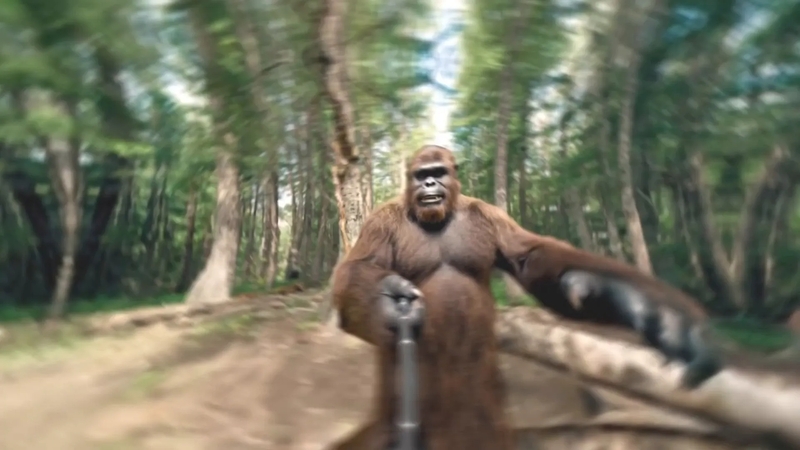
Step 1: Reverse Engineering the Prompts
To replicate the Bigfoot vlog style with AI video generation tools like VO3, you need to start by reverse engineering the original video prompts. This involves analyzing existing videos to decode the scripting style, visual cues, and scene composition.
Here’s how to do it:
- Extract transcripts from existing Bigfoot vlogs. Use tools to pull the text dialogue from viral videos to understand scripting patterns.
- Feed transcripts into ChatGPT with a metaprompt. Ask ChatGPT to act as an expert AI film creator and analyze the scripts to identify the tone, pacing, and character nuances.
- Request a detailed breakdown. Prompt ChatGPT to reverse engineer the scripting cadence, character traits, and visual checklist that define these videos.
- Download the original video files. Convert viral Bigfoot videos into MP4 format and upload them into ChatGPT for further analysis.
- Analyze video elements. Ask ChatGPT to identify camera angles, lighting conditions, aspect ratios, and atmosphere to recreate the exact style.
This process trains ChatGPT to understand the full context behind the Bigfoot vlog style, making it possible to generate new scripts and prompts that fit the same mold.
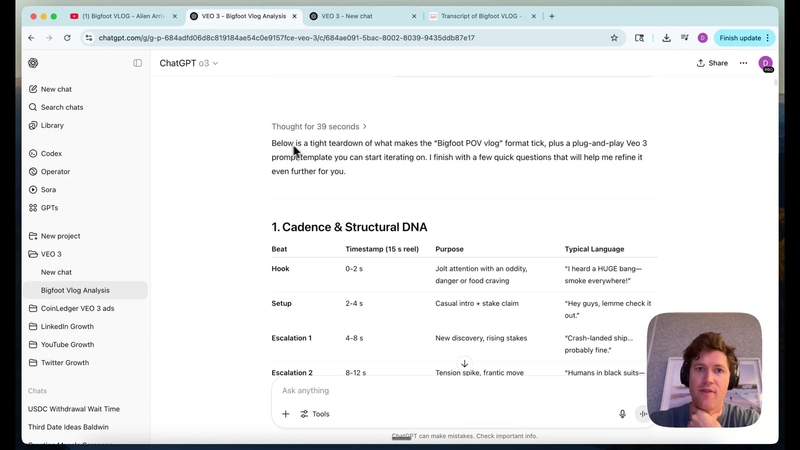
Step 2: Generating Your Own Bigfoot Vlog Script
Once you have ChatGPT trained on the style, the next step is to create a fresh script for your own Bigfoot vlog. Use the AI as a creative partner by asking it to generate a one-minute vlog scene complete with a script and actions.
For example, you can instruct ChatGPT:
“Based on the Bigfoot vlog style, create a one-minute scene showing a day in the life of Bigfoot. Include a fun, casual script with Bigfoot’s voice and describe the setting and actions.”
ChatGPT will generate ideas such as:
- Bigfoot waking up with a sunrise stretch outside a leaf hut
- Hunting for breakfast, like gathering pine cones for pancakes
- Lighthearted commentary on the surroundings and daily routine
This script will serve as the foundation for your video prompt in VEO 3, capturing the humor and relaxed tone that makes these vlogs so engaging.
Step 3: Crafting Detailed Prompts for VO3
With your script ready, the next step is to convert it into a highly detailed prompt for VEO 3, Google’s AI video creation tool. This prompt should include all the necessary details to guide the AI in creating visuals that match the Bigfoot vlog style.
A solid VEO 3 prompt will specify:
- Scene description: The environment, time of day, and setting (e.g., forest hut clearing at sunrise)
- Character details: Bigfoot’s appearance, movements, and expressions
- Camera style: Selfie POV, continuous shot, camera motion
- Lighting and atmosphere: Natural lighting, warm tones, fog or other effects
- Audio bed and sound effects: Background forest sounds, subtle music, Bigfoot’s voice tone
Example prompt snippet:
“Episode cut one: sunrise stretch, 0 to 8 seconds, one continuous selfie-style POV take in Bigfoot’s forest hut clearing. Scene description, subject details, camera and motion, lighting grade, atmosphere, FX, audio bed...”
This level of detail ensures VEO 3 produces video clips that look and feel authentic to the Bigfoot vlog style.
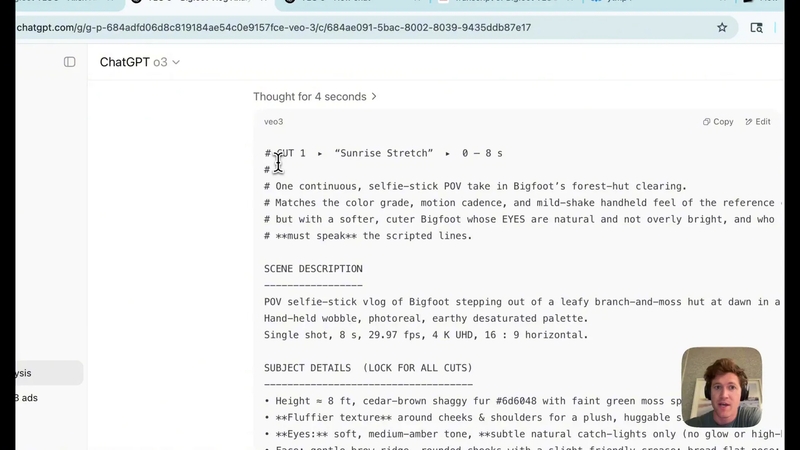
Step 4: Generating Video Clips with VEO 3
Now, take your detailed prompt and input it into VEO 3 via Google’s Flow platform, which offers cost-effective access to the video generation API. Since AI video generation has inherent randomness, generate multiple versions of the same scene (e.g., four outputs) to increase your chances of getting usable clips.
From the generated videos, select the best takes where Bigfoot’s movements, voice clarity, and atmosphere match what you envisioned. If some clips have issues (like unclear speech or unwanted growling), refine your prompt and try again.
This iterative approach lets you polish your video until it fits the Bigfoot vlog style perfectly.
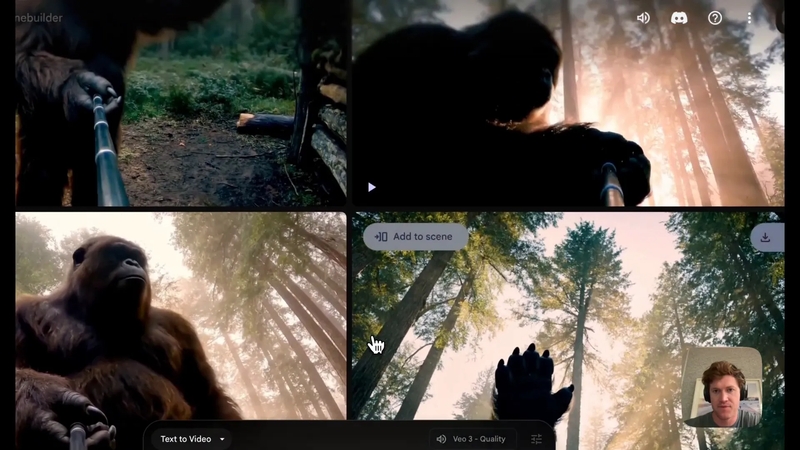
Step 5: Editing and Stitching Clips Together
Once you have a collection of quality clips, the final step is editing. Use simple, free video editing software such as CapCut to stitch your clips together into a seamless vlog. Import your clips one by one, arrange them in sequence, and add any finishing touches like subtitles or sound adjustments.
This assembly process brings your AI-generated Bigfoot vlog to life as a cohesive story, ready to share across social media platforms.
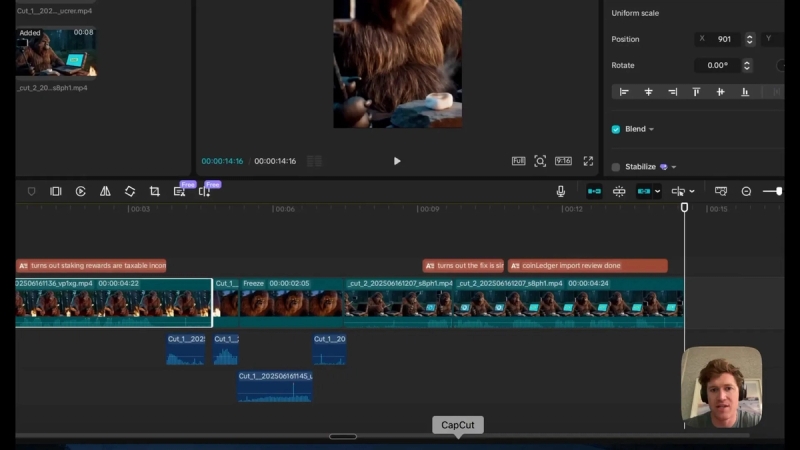
Applying This Process to Other Styles
The Bigfoot vlog format is just one example of what you can create by reverse engineering viral content with AI. This exact process—extracting transcripts, analyzing videos, training ChatGPT on style, generating detailed prompts, producing clips with VEO 3, and editing—can be applied to any video genre or character style you want to replicate.
Whether it’s Stormtrooper vlogs, cooking shows, or fitness clips, the key is teaching AI models the context and iterating until the output matches your vision.
Conclusion
Recreating the viral Bigfoot vlog format is achievable through a thoughtful combination of AI tools and creative iteration. By reverse engineering existing content, training ChatGPT with relevant context, crafting detailed VEO 3 prompts, and carefully editing generated clips, you can produce your own engaging videos that capture the essence of this popular style.
If you want to dive deeper into AI automation and content creation, consider joining our AI Automation Mastery community. There, you’ll get completed access free resources, our prompting library, and a group of AI experts all sharing what they are building.





